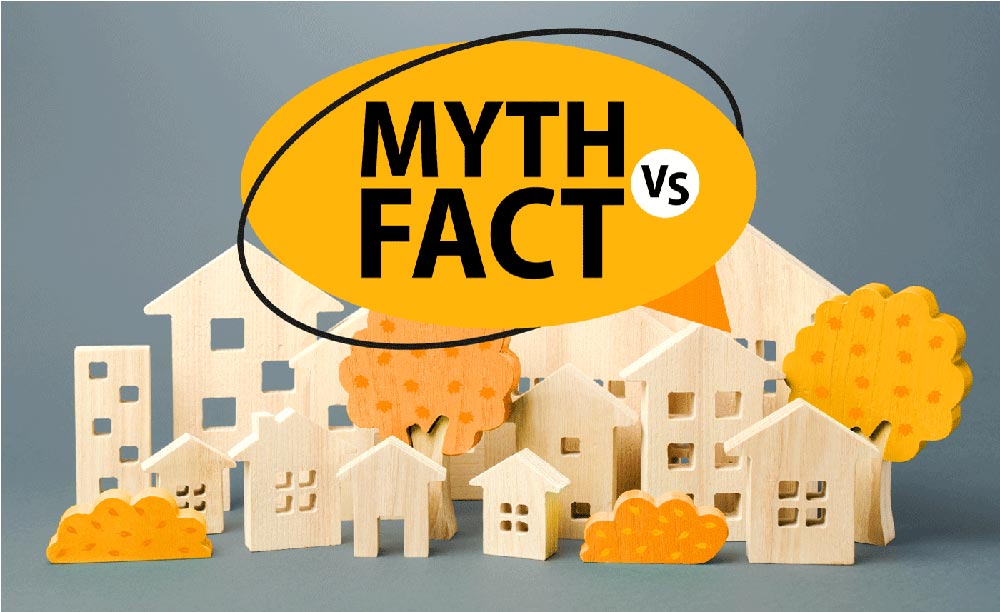Myth vs. Fact: Addressing the U.S. Housing Affordability Crisis
There’s widespread agreement that there is a housing affordability crisis brought on by a long-standing undersupply of apartments and single-family homes. Now that the apartments that were delayed due to COVID have come on the market in many locations, we are seeing rents drop significantly across the country. Regardless of this temporary market correction, the housing shortage is not going away. Now is the time for federal, state and local government officials to join together with housing providers to focus on additional solutions to drive down housing costs.
President Biden recently made comments vowing to address housing affordability. However, much of the Administration’s “fact sheets” on housing are based on inflammatory, election-year rhetoric designed to point fingers at housing providers, rather than focusing on the facts and actionable solutions Americans need to keep housing more affordable. The data is clear: There is really only one proven way to ensure Americans have affordable housing options now and in the future—build more housing. The U.S. needs to build 4.3 million more apartments by 2035 to meet the anticipated demand.
The Administration agrees. In a preview of President Biden’s remarks on housing affordability, Domestic Policy Council Director Neera Tanden stated, “We know we need to increase housing supply to ensure that we can bring down the rents and the cost of homeownership. That is the premier objective of this administration.” If the Administration and housing providers agree on the solution, then blaming housing providers will not solve the problem, build another home or make housing more affordable.
We urge the Administration to stop the finger-pointing and, instead, work with housing providers to build the housing Americans need and deserve.
MYTH: Fees are making housing less affordable: Application fees and other costs outside of direct rent payments are another form of hidden and “junk” fees.
FACT: Rental housing providers strongly support transparency in the cost of rental housing. Leases clearly spell out costs that residents may incur. NMHC strongly disagrees with the characterization that fees associated with leases are “junk fees” and that rental housing residents are being taken advantage of by housing providers. Fees beyond rental costs are not designed to increase profit margins; rather, they are typically associated with providing additional services that renters need beyond the provision of housing. Renters can comparison shop and choose a housing provider that meets their needs and budget.
MYTH: “Corporate landlords”: Institutional or corporate landlords dominate the rental housing market and are bad for tenants.
FACT: As the Urban Institute pointed out in their blog “Place the Blame Where It Belongs,” policymakers must look at supply as a way to lower costs. Indeed, they go further by stating “developers who build high-end housing are not driving up home prices; they are creating additional units.” Renters typically know their housing provider or manager personally and vice versa. The “corporate investors” in housing include teacher and firefighter pension funds, as well as large, public companies that invest in multifamily housing and whose shares are owned by everyday people. We need all housing providers and investors – large, small and everyone in between – to be committed to being part of the housing affordability solution. Government will not provide the money needed to build housing, so private investment is crucial. Two out of three apartment owners are individual investors, not big corporations.
The great majority of renters in this nation are happy with their housing provider. In fact, a recent national survey of over 172,000 renters found that 85% of residents surveyed reported that they enjoy living in their community; 86% reported that their property staff demonstrate a culture of respect and kindness.
MYTH: “Rising rents”: Rents are rising across the country; property owners are “gouging” residents.
FACT: We all agree that helping people afford their homes is a priority, but the cost of rent must be put into context. Rent has been falling in many cities where housing affordability has been particularly acute, a result of new housing units being built to satisfy the increased demand. Additionally, rental housing providers are facing rising cost drivers they do not control like labor, property taxes, insurance and materials. These costs are the main drivers of rent increases.
MYTH: “Rising rents”: Building more supply does not alleviate the cost of rental housing.
FACT: Recent research shows that more supply can combat rising rents while an analysis by the NYU Furman Center cites “dozens of studies” that debunk the notion that more supply would not help rental prices. The research looked at municipalities across the world and showed the benefit of increasing supply, not just in lowering costs but in reducing increases as well.
The increased Federal investment in housing supply, as the President proposes through the Biden Administration’s Housing Supply Action Plan, and a regulatory environment that incentivizes more investment in rental housing will make a difference. So will basing this discussion around a set of agreed-upon facts while foregoing unhelpful, political rhetoric.
Rental housing providers are committed to building the housing our nation needs as part of public-private partnerships. However, blaming housing providers, the very people who can help create the needed housing, with unproven allegations will not make housing more affordable and is counterproductive.
Rental housing providers stand ready to help meet the rising need for accessibly priced rental housing.
Written by Colin Dunn, national multifamily housing council (nmhc)
Colin Dunn is Vice President, Public Affairs and Communications of the National Multifamily Housing Council (NMHC), with primary responsibility for the Council’s advocacy communications, stakeholder outreach, media relations and member communications. Based in Washington, D.C., the NMHC is where rental housers and suppliers come together to help meet America’s housing needs by creating inclusive and resilient communities where people build their lives. NMHC provides a forum for leadership and advocacy that promotes thriving rental housing communities for all.









